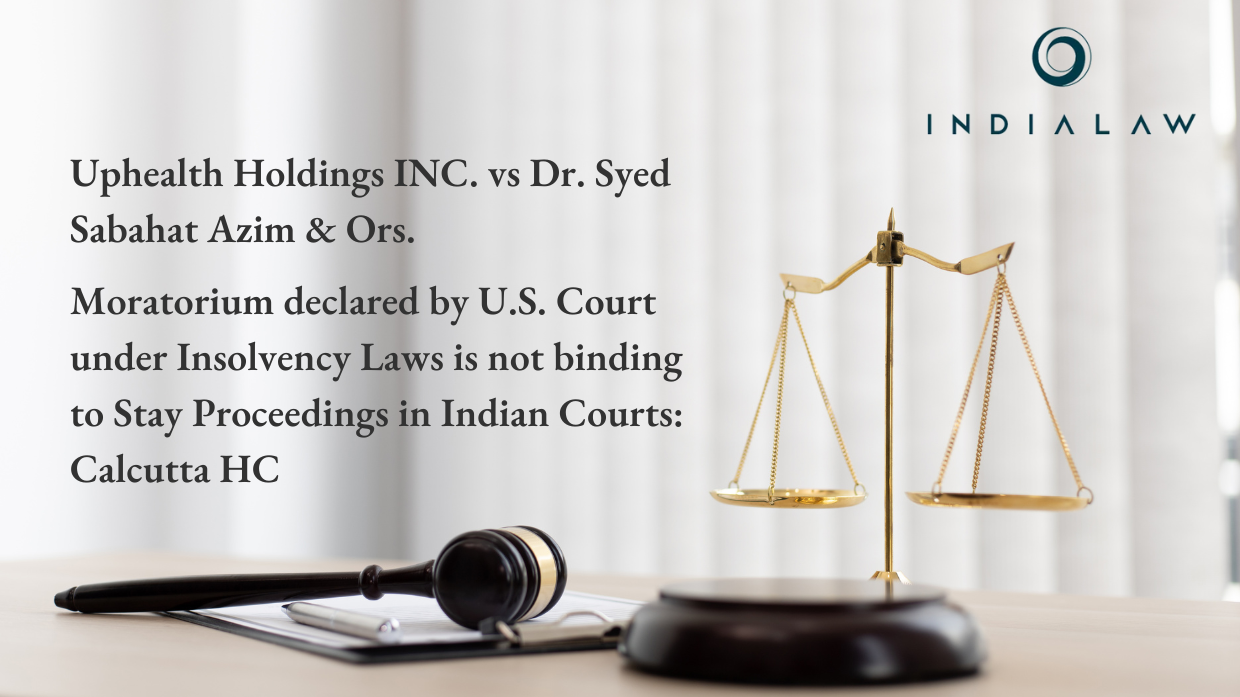Uphealth Holdings INC. vs Dr. Syed Sabahat Azim & Ors. – Moratorium declared by U.S. Court under Insolvency Laws is not binding to Stay Proceedings in Indian Courts: Calcutta HC

Introduction:
In the case of Uphealth Holdings INC. vs. Dr. Syed Azim & Ors., the Calcutta High Court while dismissing the Revision Petition held that moratorium declared under the United States Bankruptcy Law is not binding on the courts while passing an order of stay in the Indian proceedings.
Table of Contents
Facts:
In the present case, the Respondent filed an anti-arbitration suit against the arbitration proceedings. During the pendency of the said suit, the Petitioner filed an Application under section 151 of the Code of Civil Procedure, 1908 praying for a stay on the anti-Arbitration Proceedings on the grounds of the moratorium order passed by US Bankruptcy court under Chapter 11 of the U.S. Bankruptcy Code. The said Application was rejected by the trial court as U.S.A is not a reciprocating territory under Section 44A of the Civil Procedure Code. The Petitioner has challenged the said order by way of the Revisional Application.
Contentions of the Parties:
The Petitioner contended that the suit should have been stayed or adjourned until the expiry of the moratorium in the U.S. Bankruptcy proceeding. The specific contention of the Petitioner was that the moratorium under Chapter 11 of the Code is operated as a worldwide temporary stay. The counsel further relied on the doctrine of Comity of Courts which states that the courts of one nation or jurisdiction should respect and recognise the decisions rendered by competent courts of other jurisdictions. The counsel relied on Toshiaki Aiba as the Bankruptcy Trustee of the Estate of Vipun Kumar Sharma vs Vipan Kumar Sharma & Ors.[1], M/s Stanbic Bank Ghana Limited vs M/s Rajkumar Impex Pvt. Limited[2], Jet Airways India Ltd. vs State Bank of India and Ors.[3] where the Indian courts recognised the decisions of foreign courts and substantiate that the doctrine of comity conveyed something more than courtesy or good will. The counsel submitted that in the absence of any statute to regulate cross border insolvency, the courts ought to rely on the Doctrine.
The counsel for the Respondent contended that Section 151 of the Civil Procedure Code cannot be invoked as the moratorium order of the U.S. Court would apply to creditors and not the Respondent who instituted an anti-arbitration suit, not an insolvency proceeding. With regards to arbitration laws there are no treaties or conventions or legislations which recognised the moratorium proceedings in the U.S. Bankruptcy Court. A decree of a foreign court could be executed by the Indian Courts only if the said country was recognised as a reciprocating territory under Section 44A of the Civil Procedure Code. Where there is no reciprocity, the party must file a regular suit under Section 13 and 14. Moreover, the Central Government has not notified any country under Section 234 of the IBC, 2016 as well. The counsel further relied on Y. Narasima Rao vs. Y. Venkata Lakshmi[4] where the Supreme Court held that no country could sacrifice its internal unity, stability, tranquillity for the sake of uniformity of rules and Comity of Nations.
Decision of the Court
After hearing contentions of both the parties, the Court concluded that it was not bound to stay the suit only because the proceedings were going on in a foreign country as provided under the explanation of Section 10 of the Code. Secondly, the proceedings before the suit court were not an insolvency proceeding. While addressing the precedents quoted by counsel for the Petitioners, the court held that they were all based on principle of globalization of commercial relationships and recognition of moratorium granted by foreign courts in respect of insolvency proceedings as the philosophy behind them was that the courts should assist insolvency proceedings. Since the anti-arbitration suit does not fall under any of those categories, the precedents are not relevant.
The Hon’ble court acknowledged the rise in cross-border insolvency issues due to increasing international transactions, emphasizing the importance of recognizing foreign proceedings in an effective insolvency regime. While Indian courts recognize foreign judgments from some countries like the UK and Singapore, they do not yet recognize foreign insolvency proceedings. Addressing the issue of comity of courts, the court cited Surya Vadanan vs State of Tamil Nadu & Ors.[5], where the Apex Court held that comity is a principle of self-restraint. Consequently, domestic courts should recognize and follow foreign court orders from earlier proceedings, applying them as far as possible in the interest of judicial discipline and self-restraint. Further, relying on Nithya Anand Ragavan vs State (NCT of Delhi) & Anr.[6], where the Apex Court held that the principle of first strike is not applicable, and domestic courts should consider pre-existing orders from foreign courts when deciding a case.
In the present case, the Court emphasized that the present suit was prior suit and the moratorium order was passed by the U.S. Court on 24.10.2023. Since it was not a pre-existing of a foreign court, thus it need not be considered. Even though the principle of comity has been recognised by the Indian Courts, in the present case there is no money claim or any other claim covered under Chapter 11 in the U.S. Bankruptcy Code and thus, the suit can continue. Hence, the Revision Application was dismissed.
[1] 2022 SCC Online Del 1260
[2] Company Appeal (AT)(Insolvency) No. 213/2018
[3] Company Appeal (AT) (Insolvency) No. 707 of 2019
[4] 1991 (3) SCC 451
[5] (2015) 5 SCC 450
[6] (2017) 8 SCC 454
By entering the email address you agree to our Privacy Policy.



